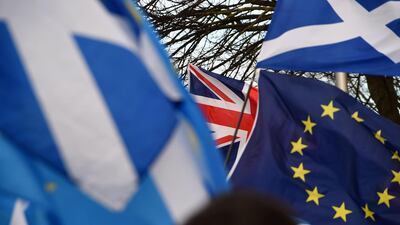The country I live in is never clear about its name. My passport says “the United Kingdom of Great Britain and Northern Ireland", and citizens of the UK may call themselves British, English, Scottish, Welsh or from Northern Ireland.
Normally it does not much matter, but this is not "normally".
Earlier this month, the UK Prime Minister Boris Johnson was taken to hospital with "persistent coronavirus symptoms". He returned to work on Monday. But even before he was laid low by Covid-19, Mr Johnson was a part-time Prime Minister.
The Sunday Times newspaper revealed that, as the coronavirus pandemic began, Mr Johnson took two weeks' holiday with his pregnant girlfriend at Chevening, a country house used by British government ministers. The Chevening website says: "The gardens include a lake, maze, parterre and a double hexagonal-walled kitchen garden amounting in all to some 40 acres. Over 530 acres of mixed woodland surround the extensive park."
The newspaper also revealed that Mr Johnson had missed five "Cobra" meetings. Cobra is an emergency committee that meets to discuss major threats to the UK – terrorism, or in this case, coronavirus. Government spokespersons and spin doctors defended the Prime Minister by saying that it was normal for other ministers to chair these meetings.
But – to repeat – these are not normal times. It is difficult to think what could be more important at a time of a pandemic to keep the person nominally in charge of the country away from five meetings to deal with that crisis.
The problem is that Mr Johnson has a track record of being part-time and inattentive.
He was a part-time mayor of London, combining that important job with being a part-time member of Parliament and a columnist for The Daily Telegraph newspaper. He went on to become a part-time foreign secretary, a position in which British diplomats privately said that he was not very assiduous at reading his important briefing papers. He is not, even friends concede, a "details" person.
Again, I am only glad to see him return to Downing Street and attempt to redress this and revive his reputation. But here is the catch: politicians do not like vacuums. While Mr Johnson has been missing in action, other parts of our peculiar country – Scotland, Wales and Northern Ireland – have their own devolved administrations and some very able politicians who are taking their own decisions on how to deal with the pandemic.
Scotland’s First Minister, Nicola Sturgeon, has been especially forthright. While government ministers in London have promised more testing for coronavirus, and more protective gowns and masks for health workers, they have often failed to deliver. In Scotland, Ms Sturgeon has moved ahead on her own, publishing a 26-point framework as part of what she called a “grown up” conversation with the public about how to proceed.
She asked how together we might achieve a “semblance of normality” while still bearing down on the disease. She talked of a “better balance” between keeping people safe and reviving the economy, asking whether more shops and businesses should open and if schools might also open if class sizes were cut.

This was no magic formula. But it was an adult politician thinking aloud, and yet this initiative was rejected by Matt Hancock, the UK Health Minister sitting in London, although it is difficult to understand what he was objecting to. Then some of Mr Hancock’s senior Conservative party colleagues began telling British newspapers that maybe Ms Sturgeon was showing real leadership.
She is. And that is what has been lacking in London.
The administration in Wales also suggested they may take a different view of how to proceed from the London government. In Northern Ireland – separated from the rest of the UK by sea and yet sharing an island with the Irish Republic – the First Minister in Belfast, Arlene Foster, suggested that she also might go in a different direction from London.
Of course, we all broadly want the same thing: to save lives and rescue the economy. But different parts of the UK going in different directions may be a powerful sign for the future.
One day, coronavirus will be less of a problem – and Brexit will still not be "done". Mr Johnson famously said that he would "get Brexit done" but like many of his projects, he has not actually completed what he promised. Scotland, Wales and Northern Ireland have very different views and concerns about Brexit from those of the largely English Conservative government in London. People in Scotland and Northern Ireland voted to remain in the European Union and the Welsh administration is not much of a fan of Mr Johnson's ideas either.
Our strange United Kingdom will stay united to fight the common threat from a disease. But when coronavirus recedes, Brexit will rise again. Mr Johnson may well find that this kingdom of ours is less than united by his Brexit plans, and many are unimpressed by his lack of attention to details.
Brexit, like the threat from Arnold Schwarzenegger's character in The Terminator science fiction film, will be back. Unlike coronavirus, there is not even a possible scientific breakthrough that can vaccinate the UK against the difficulties ahead.
Gavin Esler is a journalist, author and presenter


